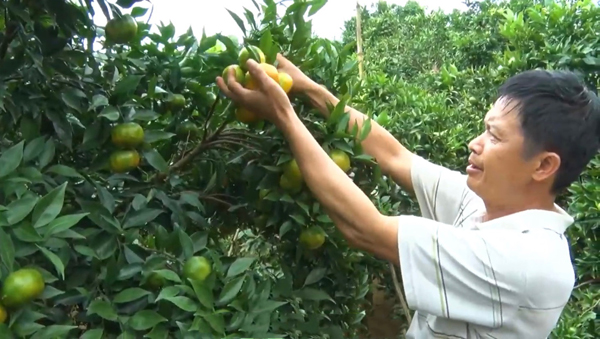
(HBO) - A project on boosting connectivity in the sale of the Nam Son tangerine has been carried out in Van Son commune since the beginning of 2019. Stakeholders in the connections have benefited from packaging and financial assistance to introduce their specialty at festivals and fairs. The participating households have also received training and guidance in the application of VietGAP and food safety standards, as well as support in tracking label usage, trade promotion and advertising.
 A
farmer in Van Son commune of Tan Lac district harvests the Nam Son tangerine
grown in the 2019 – 2020 crop. The variety has proved profitable.
A
farmer in Van Son commune of Tan Lac district harvests the Nam Son tangerine
grown in the 2019 – 2020 crop. The variety has proved profitable.
Developing the Nam Son tangerine production under
value chains has helped created a stable market, raise farmers’ income, and
supply safe and high-quality fruits for consumers. Locals’ intensive farming
skills have also been improved thanks to training in sci-tech application and
application of VietGAP standards, thereby promoting safe agricultural practices
and local farm produce’s competitiveness.
Besides, the project has been implemented on the
tangerine area that is bearing fruit, which did not change the status of land
and water resources or pollute the environment.
Recognised as a collective trademark by the
Intellectual Property Office of Vietnam (the Ministry of Science and
Technology) and meeting VietGAP standards, the Nam Son tangerine has gained an
increasingly firm foothold and won over consumers’ trust.
Farmers’ awareness has been gradually improved,
leading to more application of sci-tech advances to cultivation. Parties
involved in the project have also fulfilled their roles in product marketing.
As a result, the tangerine has secured stable sales and had its standing raised
in agricultural production. Buyers of the Nam Son tangerine are mostly from
Thai Nguyen, Son La, Ha Noi and Thanh Hoa.
The project has been implemented at a total cost
of 815 million VND (nearly 35,000 USD). With an output of 20 tonnes per ha and
prices of 20,000 – 30,000 VND per kg of fruit, farming households now earn an
average income of 300 – 350 million VND per ha, which is expected to reach 400
– 450 million VND per ha this year./.
Hoa Binh province’s economy posted an impressive Gross Regional Domestic Product (GRDP) growth rate of 12.67% in the first quarter of 2025, representing a 12.76% year-on-year increase, the highest rate recorded since the beginning of the current tenure, according to the provincial Statistics Office. This robust growth reflects years of strategic groundwork and sets a strong foundation for the province’s annual growth target of over 10%.
With a focus on cash crop farming with science - technology application and brand building, Lac Thuy district is gradually increasing production value, improving people's life quality, and laying the foundation for sustainable socio-economic development.
In recent years, the economic development model "Hoa Binh Earthworm Farm” run by Mr. Bui Van Dang in Co Giua Hamlet, My Thanh Commune (Lac Son district) has not only brought stable economic value but it is also environmentally friendly, helping to protect and reduce pollution, contributing to the construction of a green and sustainable agriculture.
Dao Village’s honey – a product certified with a 3-star OCOP (One Commune One Product) rating by Thong Nhat Agricultural Cooperative in Dao Village (Hoa Binh City) – is highly regarded by consumers for its quality, richness, and variety in packaging. The distinctively sweet taste of Dao Village’s honey leaves a lasting impression on anyone who has tried it.
In alignment with Project No. 07-DA/TU, issued by the Hoa Binh provincial Party Committee on November 1, 2021, Lac Thuy district has actively promoted investment and supported the sustainable development of its industrial and handicraft sectors during the 2021–2025 period. Alongside this, the district has remained committed to preserving and revitalising traditional craft villages.
Located in the northern part of Lac Thuy district, with a temperate climate and fertile soil, Phu Thanh commune has great potential and advantages in growing tea. The long-standing experience, combined with strict adherence to organic farming practices in the tea gardens, ensures that the dried tea products from Phu Thanh and Lac Thuy as a whole are sold out immediately upon production, providing a stable and prosperous life for the local people.



 A
farmer in Van Son commune of Tan Lac district harvests the Nam Son tangerine
grown in the 2019 – 2020 crop. The variety has proved profitable.
A
farmer in Van Son commune of Tan Lac district harvests the Nam Son tangerine
grown in the 2019 – 2020 crop. The variety has proved profitable.